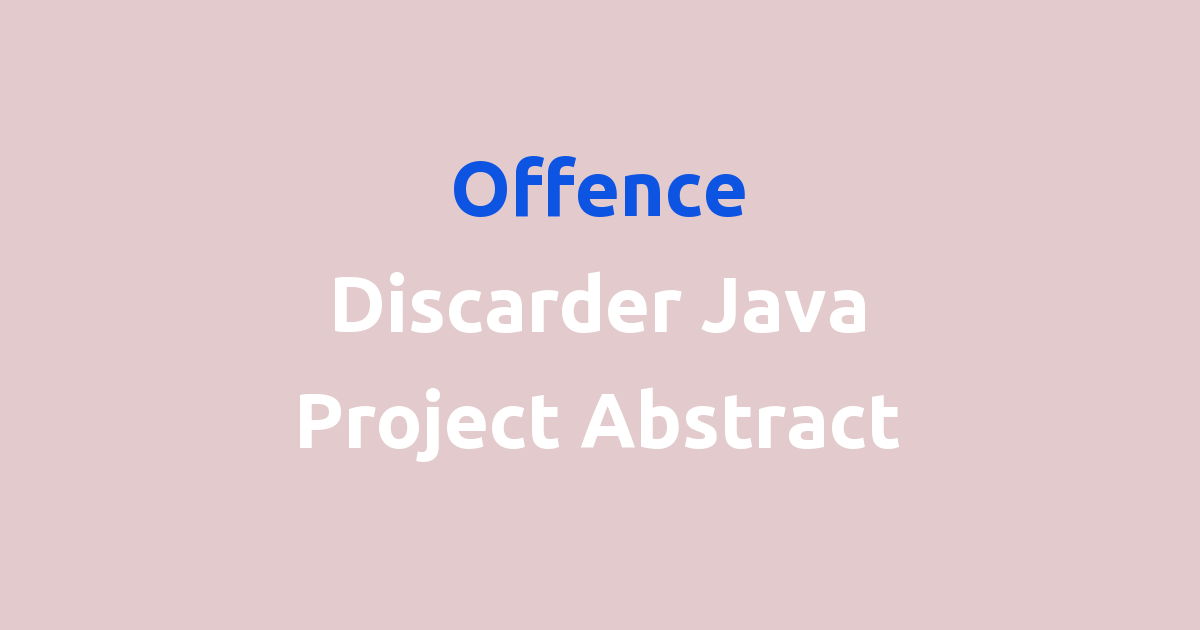Abstract for the Java project that discards offensive content.
Offence Discarder Java Project Abstract
Introduction:
In today’s digital age, technology plays a crucial role in every aspect of our lives. As an engineering student studying bachelor of technology in India, I have always been fascinated by the power of technology to solve complex problems. One such problem that caught my attention is the issue of managing and discarding offensive content on the internet. With the growing popularity of social media platforms and online forums, the need for an efficient system to filter out offensive content has become more pressing than ever.
Problem Statement:
The internet is a vast and diverse space where people from all walks of life come together to share ideas, opinions, and information. However, this freedom of expression also comes with a downside – the spread of offensive and harmful content. From hate speech to cyberbullying, the internet is rife with content that can cause harm and promote negativity. The challenge lies in developing a system that can accurately identify and discard such offensive content in real-time.
Existing System:
Currently, most social media platforms rely on manual reporting and moderation to handle offensive content. Users are encouraged to report any content that they find offensive, and a team of moderators reviews these reports and takes action accordingly. While this system works to a certain extent, it is not foolproof. Offensive content can slip through the cracks, and the process of moderation can be time-consuming and inefficient.
Disadvantages:
The reliance on manual reporting and moderation has several drawbacks. Firstly, it puts the onus on users to identify and report offensive content, which can be a subjective and tedious process. Additionally, the sheer volume of content on the internet makes it impossible for human moderators to review every report in a timely manner. This leads to delays in taking down offensive content, allowing it to potentially cause harm in the meantime.
Proposed System:
To address these challenges, I propose the development of an automated offence discarder system using Java programming language. This system will leverage machine learning algorithms to analyze text, images, and videos in real-time and flag any content that is deemed offensive. By automating the process of content moderation, we can ensure that offensive material is identified and discarded quickly and efficiently.
Advantages:
The automated offence discarder system offers several advantages over the existing manual moderation process. Firstly, it eliminates the need for users to report offensive content, as the system can proactively detect and discard such material. This reduces the burden on users and ensures a more consistent and objective approach to content moderation. Additionally, the real-time nature of the system means that offensive content can be identified and removed instantly, minimizing the potential harm it can cause.
Features:
The offence discarder system will include several key features to enhance its effectiveness. These features include:
1. Text analysis: The system will use natural language processing algorithms to analyze text content for offensive language, hate speech, and cyberbullying.
2. Image recognition: The system will employ image recognition technology to scan images for inappropriate content, such as nudity or violence.
3. Video screening: The system will have the capability to analyze videos for offensive material, such as hate speech or graphic violence.
4. Real-time monitoring: The system will continuously monitor incoming content and flag any offensive material as soon as it is detected.
Conclusion:
In conclusion, the automated offence discarder system offers a promising solution to the challenge of managing offensive content on the internet. By leveraging machine learning algorithms and real-time monitoring, this system can effectively identify and discard offensive material, reducing the potential harm it can cause. As an engineering student, I am excited by the potential of this project to make a positive impact on the online community and promote a safer and more inclusive digital environment.

